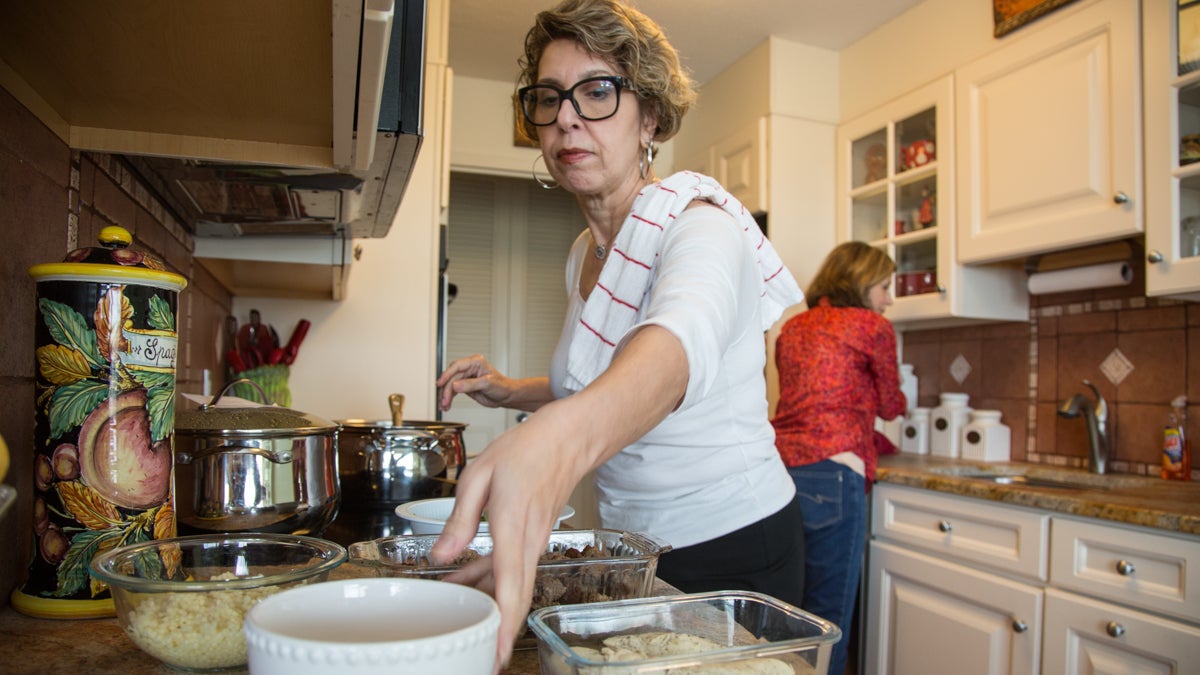The fear and silence that came with mom’s broken bones and black eyes
Listen
Judith Bonaducce's newly published memior "Just Add Water" is told from the perspective of having been a child watching the domestic abuse her father caused her mother. As she tells this story she weaves recipes for soup through her storytelling. Here she is starting to add together all her pieces for her Italian Wedding Soup. (Emily Cohen/for NewsWorks)
Stomach tight. You’d get blocked vision. You feel like you can’t breath. Your heart’s beating out of your chest. Abject fear that he’s beating her again. You know, you tried to escape from it, you couldn’t.
Now in her 60s, nurse educator Judith Bonaduce finally feels free to talk about the family violence she witnessed as a girl. Using a pseudonym, she wrote a memoir “Just Add Water” about her experience—for WHYY’s “The Pulse” she told the following story using her own name.
“Born and raised in West Philadelphia, I grew up at 49th and Girard. My one grandmother lived up the street. I had three or four aunts on the same streets–father’s sister, mother’s sister. So there were relatives everywhere.
We had an Italian grapevine long before that song was made. Cause when you got home, when you did something wrong, when you walked in the door, your mom already knew what you did wrong.
My father was a tough guy. Good man, but just a tough guy. Really bad temper. He was a bricklayer. He was probably around 5′ 10,” Probably around 230 pounds. I think he had a 55-inch chest, my mother would always say, and his waist was a 30, she would say.
[He] would beat my mother, horribly. Beat my brother, horribly.
I was probably around 10. She was at the buffet in the dining room, and my father was in the living room and he started to verbally spar with her back and forth, and she’d never back down. So he kept sparring with her, she kept sparring with him. He finally jumped up, spun her around and punched her really hard in the stomach.
The first thing I did was run down the alley to get my grandmother because after she fell to the floor, he kept kicking her. So I got my grandmother, when she came up she started cursing in Italian … ‘Call the police, call the police.’
I forget the name, number for the police but I had it memorized. I would just sneak down the stairs and call them and they would come. Then they would talk to my mother and my father: ‘What’s going on? You don’t really want him to go to jail, do you, lady?’ And my mother would be the first to say, ‘No, don’t take him to jail.’
It was anything and everything. The garlic wasn’t cut small enough. There weren’t enough tomatoes in the salad. The chicken wasn’t on the table cooked and cooled when he walked in the door. Anything and everything.
Stomach tight. You’d get blocked vision. You feel like you can’t breath. Your heart’s beating out of your chest. Abject fear that he’s beating her again. You know, you tried to escape from it, you couldn’t. It’s everywhere inside the house.
The things I did to not to hear it were tremendous when I was a kid–putting the blanket over my head, getting under the bed, putting the fan on.
The nuns taught us you prayed all the time. Jesus, have him stop hitting my mother and my brother. Please have him stop. Please have him stop.
My cousin said to me years later: ‘Wow, your father would walk into the house, if the radio was on, we shut it off, if the TV was on, we shut it off.’ We just sat down and sat like little soldiers, because we were afraid. We were afraid.
Broken finger. Broken wrist. Broken arm. Ruptured spleen. Black eyes. [My mom] just went through the world like that, she didn’t usually go to the doctor.
It’s that silence. It’s that diabolical, insidious [silence]. You don’t tell, it’s like an alcoholic kind of thing. You just don’t tell.
Tough lesson for a little girl to take, to learn.
My mother looked like a movie star. Dark hair, dark eyes, beautiful, she loved make up. He would get mad if she wore something that he didn’t like. He would get mad if she didn’t talk. He would get mad if she did talk. Then he would beat my mother, he would beat my brother.
Somehow I was spared, but was I spared?
My mother’s main explanation for everything that was going on was: ‘He’s still your father.’ And she would say, ‘stop it, it’s not as bad a you remember it, you always remember all the bad things.’ Well, I do remember a lot of the bad things. It’s who I am, it’s what it is.
It lives with everything I do. I see it through that lens. It sets a pattern where I wait for the other shoe to drop.”

At left, a picture of Judith and her mother, Julia, on Christmas of 1950. At right, Judith makes Italian Wedding Soup. (Emily Cohen/for NewsWorks)
Editor’s note: Health researchers say living in a home with domestic violence can create chronic stress as kids try to predict when the next bad thing will happen. Children can become hyper vigilant—on guard to protect a parent, sister or brother—and at the same time, feel helpless. If you need help, the National Domestic Violence Hotline – 1-800-799-SAFE (7233) – has advocates available 24 hours a day. This piece was produced by Taunya English.
WHYY is your source for fact-based, in-depth journalism and information. As a nonprofit organization, we rely on financial support from readers like you. Please give today.



